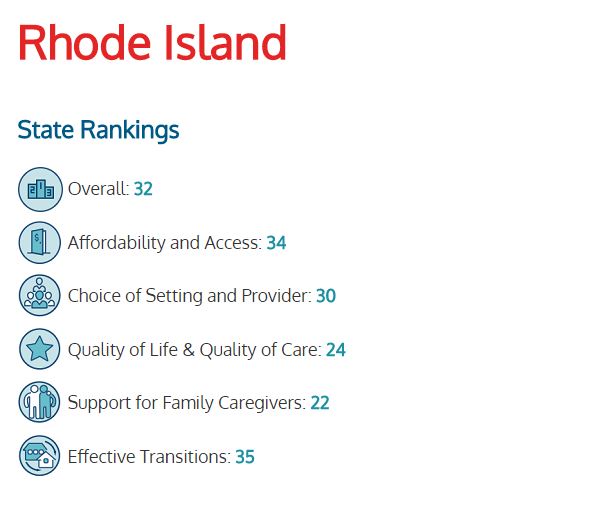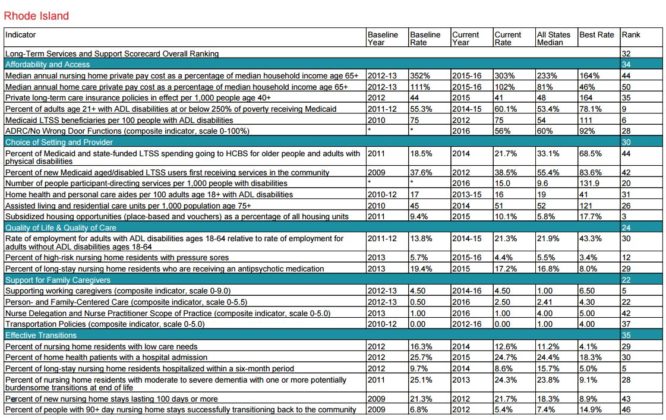
PROVIDENCE – Rhode Island ranked No. 32 of states in the nation on AARP’s scorecard for long-term services and supports for older adults, people with physical disabilities and family caregivers in a report released on Wednesday.
The report weighs five categories of data: affordability and access, choice of setting and provider, quality of life and quality of care, support for family caregivers and effective transitions.
The five AARP Rhode Island scorecard rankings:
- 34 for affordability and access
- 30 for choice of setting and provider
- 24 in quality of life and quality of care
- 22 for support for family caregivers
- 35 for effective transitions
Of the 25 indicators that made up the rankings on the scorecard, Rhode Island had six in the top quartile, two in the second quartile, nine in the third quartile and eight in the bottom quartile.
“The vast majority of older Rhode Islanders want to live independently, at home, as they age—most with the help of unpaid family caregivers,” said Kathleen Connell, state director of AARP Rhode Island, in a press release. “Even facing tight budgets, Rhode Island is making progress to help our older residents achieve that goal. However, this Scorecard shows we have more to do, and we need to pick up the pace.”
AARP’s report estimates that 134,000 residents of Rhode Island help aging parents, spouses and other loved ones by providing assistance with bathing, dressing, transportation, finances and complex medical tasks unpaid due to the prohibitive cost of long-term care costs, an approximate value of $1.78 billion.
“When it comes to helping older Rhode Islanders live in the setting of their choice, family caregivers take on big responsibilities,” Connell said. “Many juggle full-time jobs with their caregiving duties; others provide 24/7 care for their loved ones. With every task they undertake, these family caregivers save the state money by keeping their loved ones out of costly nursing homes – most often paid for Medicaid. They have earned some basic support.”
AARP of Rhode Island serves more than 138,00 members age 50 and older in the state.
Chris Bergenheim is the PBN web editor.














AARP releases these “scorecards” on a regular basis, seeking to gain funding on home and community based care for the elderly. They are right to do so in Rhode Island, because that part of the long term care continuum is under-funded. But each time they do so, they proclaim that elder care in Rhode Island is terrible, and we end up with headlines like the one above. Every. Single. Time.
Those of us in the nursing facility world then have to scramble to reassure our patients, their families, and the public that these “scorecards” do not reflect the state’s nursing home care. Why the AARP chooses to ignore the one area of elder care where we excel is beyond me, but by all objective measures, our state’s nursing facility care is excellent. The federal Centers for Medicare and Medicaid Services ranks nursing homes from one to five stars on quality — R.I. ranks fourth in the nation with respect to the percentage of nursing home beds in four or five star facilities. Our nursing homes score best in the country on annual regulatory inspection results. And we are routinely among the top states on patient and family satisfaction surveys.
It really doesn’t help to be smeared on a regular basis, simply because our state is low average on the availability of home and community based supports. The staff who provide hands-on care in our nursing facilities typically work hard to provide compassionate care, to an elderly population that many in our society seem to want to forget about. They deserve to be appreciated, not overlooked, especially by the AARP.